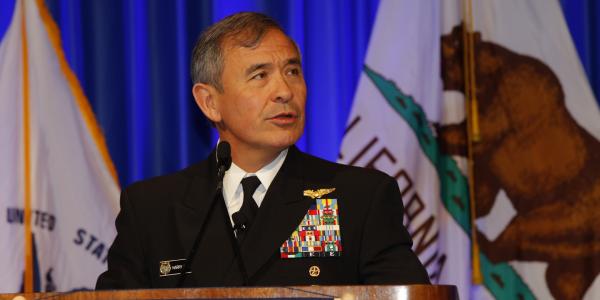'Exponential Thinking' Will Propel the U.S. Beyond its Adversaries, Adm. Harris Says
It is imperative that the United States—government and private companies alike—begin using its inherent innovative spirit to think exponentially and develop technologies that will save time, dollars and lives while defeating the nation's adversaries, said Adm. Harry Harris, USN, commander of U.S. Pacific Command. Exponential thinking were the buzzwords of his address and the cornerstone of what likely will help define the future of the U.S. military, he shared at West 2017. But getting there requires the powers that be to break paradigms that will take military forces to the next level.
It is imperative that the United States—government and private companies alike—begin using its inherent innovative spirit to think exponentially and develop technologies that will save time, dollars and lives while defeating the nation's adversaries, said Adm. Harry Harris, USN, commander of U.S. Pacific Command.
Exponential thinking were the buzzwords of his address and the cornerstone of what likely will help define the future of the U.S. military, Adm. Harris shared during day one of the three-day premier naval West 2017 conference, co-sponsored by AFCEA International and the U.S. Naval Institute. But getting there requires the powers that be to break paradigms that will take military forces to the next level, he said.
The theme for year’s conference, which runs February 21-23 in San Diego, addresses the question: Ready for Today, Modernize for Tomorrow: How Can We Maintain the Edge?
It is no coincidence that the Defense Department placed keen focus on the Pacific region. It is inextricably linked to America’s future prosperity and security, Adm. Harris said. Yet success presently hinges on four regional challenges: North Korea, China, Russia and the terrorist network Islamic State of Iraq and the Levant (ISIL). In the near-term, ISIL garners the preponderance of military might. “The main focus of our military effort, and rightfully so, is on the Middle East and North Africa,” he began. “But as we eliminate [ISIL] in those areas, some of the surviving fighters will likely repatriate to their own countries in the Indo-Asia-Pacific. What’s worse is, they’ll be radicalized and weaponized.”
North Korea has “distinguished itself as the only nation to have tested nuclear weapons in this century,” a concerned Adm. Harris shared. “Combining nuclear warheads with ballistic missile technology in the hands of a volatile leader like Kim Jong-un is a recipe for disaster.” That leader’s startling military goals must serve as a wake-up call for the rest of world and a prime reason why the U.S. military must pursue technologies such as the Terminal High Altitude Area Defense (THAAD) weapon system and F-35 Joint Strike Fighter.
Combining #nuclear warheads & #ballistic missiles is a recipe for disaster. That is #NKorea as it is, Adm Harris #WEST2017
— Sandra Jontz (@jontz_signalmag) February 21, 2017
As it stands, Russia and China do not abide by existing international agreements they have signed, which places them in a precarious spot to make a critical choice: Will they help maintain a semblance of world order?, Adm. Harris asked. “Both Moscow and Beijing have choices to make,” he said. “They can choose to disregard the rules-based security order that has served all nations, including them, so well for decades, or they can contribute as responsible stakeholders. I hope for the latter, but I have to be prepared for the former.”
After laying out the issues, Adm. Harris addressed possible solutions, which will rely heavily on increased investments in science and technology.
The military simply cannot just add new platforms to legacy systems, he said. The government will continue to depend on cutting-edge technology industry is developing to outpace adversaries. But in turn, the government owes commercial partners the promise of a revamped acquisition process that will better leverage that technical know-how.
“The most frustrating part of change is that some of the biggest obstacles we have to overcome are those we impose on ourselves,” he said, leading to his example of the problem with unnecessary restrictions on sovereign capabilities and the appropriate authorities needed to use them. “China is free to field a complete arsenal of highly capable, land-based anti-ship missiles while we’re restricted from fielding the kind of conventional weapons we must have to stay ahead of them. If we’re not going to get exponentially smarter, let’s at least get better lawyers.”
Too often, the military cannot or will not use tools industry has invested time and money in to develop, he said, leaving some wondering why they even bothered. “I can’t ask you to build something we can’t use, but we can’t leave game-changing technology on the shelf because of some restrictions on sensible security measures.”
Disruptive areas of innovation include artificial intelligence and the collaboration between people and computers, or what is termed man-machine teaming. “Now, I’m a simple analog guy from Tennessee. When I think of man-machine teaming, I think of a pickup truck hauling corn to make moonshine,” he jested. “And try as you may, you cannot digitize good moonshine.”
But that field holds great promise for change.
As do technologies that will improve inter-service collaboration. Before he leaves PACOM, Adm. Harris said he wants to see the “Army’s land forces connect exercises to sink a ship in a complex environment where our joint and combined forces are operating in other domains. Moving forward, all the services will have to exert influence in nontraditional and sometimes unfamiliar domains.”
.@PacificCommand Adm. Harris: "Innovate or die" #WEST2017
— Sandra Jontz (@jontz_signalmag) February 21, 2017
“Innovate or die,” he said. “Hope is not a strategy, and that is why everyone in this room must act now.”
Adm. Harris added, “Our country must maintain incredible combat power in concert with like-minded allies and partners to preserve unimpeded access to all the shared domains: sea, air, land, space and cyber.”
Global powers are reaching an inflection point in history. “Freedom, justice and a rules-based international order are hanging in the balance and the scale won’t tip of its own accord or simply because good people wished it so.” In a networked world that changes dramatically from day to day, the military—with staunch support, backing and input from industry—must craft methods of warfighting that link hard-powered technologies with smart-powered capabilities.
.@PacificCommand Harris says he still believes that #America is the center of gravity for innovation' #WEST2017
— Sandra Jontz (@jontz_signalmag) February 21, 2017
The United States remains the global center of gravity for innovation. “If you don’t believe me, just look at the 1 million plus international students studying in our country last year, 31 percent of which … were Chinese. My gut tells me that they’re not studying English literature.”






Comment
Silent Talk Communications Development
Thank you Admiral for the inspiring and correct forwarded thinking requirements of advancing technological abilities necessary to assist U.S. War Fighters and Planners. Especially the refreshing prospective “I can’t ask you to build something we can’t use, but we can’t leave game-changing technology on the shelf because of some restrictions on sensible security measures.” Whereas the 'sensible security measures' should be in purpose to exclusively securing the U.S. advantage rather serving as a means to prevent the technological "Battle Space" defining development. GOD Bless you, by your courage to say what needs to be said, to the very individuals ensuring our future Defense.
Comments